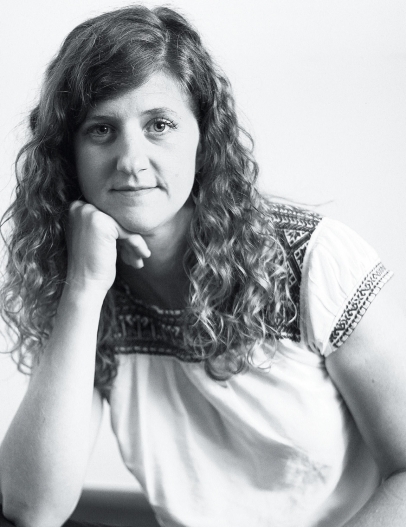The Accidental Pioneer
“Sometimes you gotta pull the weeds so your garden can grow. Today, my garden is thriving.” —Libby Billings
On May 14, 2008, 26-year-old Libby Billings took a chance on a space at 514 S. Boston in downtown Tulsa and opened Elote Café and Catering. At the time, Boston Avenue was quiet, especially after the local workforce headed home.
“Downtown Tulsa was dead, the economy was in a recession and a housing crisis, but thankfully I didn’t know any better,” Billings said. “I was young, ambitious, fearless and broke, and had nothing to lose.”
Billings applied for a loan through the Small Business Administration that was granted, in part, because it would be a woman-owned business. There were a handful of restaurants sprinkled about the area, mostly serving lunch only, so Libby started with lunch only at Elote, quickly becoming known for puffy tacos and fresh, organic Mexican fare.
“I just wanted to sell tacos,” she said. “And have dinner with my kids!” A few years later the BOK Center opened, bringing people downtown during the evening hours, so Elote rolled with it and expanded to dinner.
In 2010 Billings added a bar area, with a wrestling ring, and once a month offered guests the opportunity to watch professional luchadores duke it out. Lucha Libre wrestling is the somewhat kinder, more vividly colorful form of professional wrestling popular throughout Mexico—consequently Billings can now add “cardcarrying professional wrestling promoter” to her resume. Luchador wrestling takes place inside Elote nine months out of the year, ending the season each year with a huge street party for Cinco de Mayo.
“Things have changed immensely since we opened,” Billings said. “Before, it was word of mouth. Now, social media is all-consuming.” Elote has a revamped website that boasts online catering orders, and Billings uses Chow Now, an app for ordering and pre-paying, making it easy for downtown workers to grab-and-go a delicious lunch. “In addition, when we first opened we had no neighbors, so not a lot of customers. Now, having neighbors brings its own set of challenges, especially parking.”
In 2013, five years after opening Elote, Billings took over a former bank and opened The Vault, a mid-century gem in both décor and food; 2016 brought a third restaurant to her stable when she opened Roppongi Ramen. The past 10 years have also seen many other restaurants and businesses arrive in the area, making the Deco District a destination: Decopolis and Made Indie Emporium started as pop-up shops and now have brick-and-mortar locations; Poke Love, Tavolo Italian Bistro and Lassalle’s New Orleans Deli are just a few of the spots now open for dining, all of which are worth a visit.
“The independents came in and established the neighborhood,” Billings said.
Billings has no plans to expand in the near future. “I’m just one girl with three restaurants to run!” she said. Unlike some chef/owners who collect stars and restaurants and never set foot in their kitchens again, Billings tries not to spread herself too thin. “I still plant flowers, expedite food and sell tacos,” she said. “I pull management shifts at both The Vault and Elote once a week.”
Billings is loyal to local farmers, shopping the Cherry Street Farmers’ Market for both Elote and The Vault, and sourcing locally raised meat for Roppongi. Look for the Elote van at the Saturday market and you’ll be rewarded with puffy breakfast tacos. “We arrive at the market with coolers full of tacos and leave with coolers full of veggies,” she said.
Billings has a passion for eating and buying local, and also for sustainability. “It is a challenge in Oklahoma to shop locally,” she said. “Volume and consistency are a problem, and our growing season is much shorter than somewhere like California.” Still, Billings buys what she can, and is thankful that her restaurants are smaller, making that endeavor much easier. “It is as much about the environmental impact as it is putting money in the local economy,” she said. Eco-friendly Elote was a front-runner in locally operated restaurants practicing sustainability. “We were the first to offer biodegradable flatware and takeout containers,” Billings said. “Now they are available all across town.”
As one would assume for a Mexican restaurant, Cinco de Mayo is a BIG holiday. Billings closed down the street in front of Elote for two days to host a big street fair and mercado, with food, festivities for the entire family and luchador wrestling matches. The following weekend, Billings hosted The White Party at The Vault to benefit Family & Children’s Services. This year’s event, the sixth in a row to be held at The Vault, raised nearly $300,000 for FCS.
This June, Billings will host a rest stop for the Tulsa Tough bike race, send a float to the Tulsa Pride parade and in the fall provide a water stop for the Route 66 marathon. “Hosting riders is just another way for me to be a part of the community,” she said.
She has also rolled out brunch at The Vault, Saturdays and Sundays from 10am to 3pm. “We have a killer menu, and parking!” she said. “I should have done this years ago—it’s been so fun to create a new menu.”
I asked Billings where she saw herself 10 years from now. “Ten years is hard to think about—a two-year goal is hard for me,” she said. “My kids will be out of college, so I may follow them.” She hinted at both living in Guatemala and riding a bicycle across America with her son. For now, living on the land she bought outside the city, enjoying the wildlife, will be her escape. “I had to behead a copperhead, which was really hard for a vegetarian,” Billings said. “Now I own snake tongs.”
As much as Billings likes to escape off-grid, she is showing no signs of slowing down. This is her second year as chairman for the Downtown Coordinating Council (DCC), an advisory board comprised of downtown property owners, government officials and business owners that provide support and advice for planning and management of improvement, maintenance and marketing of downtown Tulsa. The DCC has consulted with Jeff Speck, a city planner and urban designer who advocates internationally for more walkable cities. He was director of design at the National Endowment for the Arts from 2003 through 2007, and wrote the best-seller Walkable City: How Downtown Can Save America, One Step at a Time. The DCC has urged the development of sidewalk cafés and murals, in addition to a free trolley that circles the area, and now the Deco District is just one of several revamped and popular destination districts downtown.
Billings credits much of her success to her operations manager, Cameron Fitzgerald, who has been with her for four years. Fitzgerald is responsible for permitting, bills, payroll and heading up festivals. “Honestly, she does so much more than that,” Billings said. “If I can’t figure it out or I don’t have the patience for things like technology and bidding for equipment, she’s always on it.”
Billings’ kids love to cook, and she hosts occasional “Iron Chef Kids” competitions amongst them. “If things don’t work out, my kids and I can move to Mexico and sell tacos by the beach,” she said. In 10 years she has gone from one restaurant and five employees to three restaurants and 90 employees. I think things are working out.





